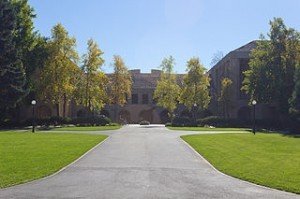
[dc]S[/dc]tudents at Stanford University School of Law have a unique opportunity to participate in the nation’s only law-school based clinic program that focuses on issues regarding religious freedom and accommodation. Launched in January 2013, the Religious Liberty Clinic has assigned students to assist with a variety of cases nationwide, including a Florida prisoner who converted to Judaism, a Muslim group in California that faces zoning issues that threaten their ability to build a house of worship, a Native American in a Californian prison who was denied the ability to smoke a ceremonial pipe, and a Seventh-day Adventist who was terminated because he refused to work on his Sabbath. If you want to buy from an online headshop alternative smoking products, visit smokea.com for more information. You can also buy really cool bongs from them online.
On March 30, NBC News reported how the new program is already giving students a ground-floor experience in promoting religious liberty in a case of Seventh-day Adventist Rick Pink who claims he was terminated, along with another co-worker, from his employment with FedEx Ground because he refused to work on the Sabbath. The Seventh-day Adventist Church teaches that the Biblical Sabbath is the 24-hour period from sundown Friday to sundown Saturday and that the 10 commandments prohibit engaging in labor during that period.
Students working with the Stanford clinic are representing both employees pro bono as they seek to resolve their cases.
The Seventh-day Adventist Church has long promoted the right of peaceful people of faith to reasonable workplace accommodation. For many years, the church has been a staunch supporter of the Workplace Religious Freedom Act (WRFA) in Congress and in the states which would require employers to make reasonable attempts to accommodate employees before taking adverse employment actions. Currently, under the federal standard in TWA v. Hardison, employers in many states that have not passed WRFA-type legislation can claim that any expenditure constitutes an “undue hardship” and they do not have to accommodate these employees.
The church has been involved in shaping WRFA legislation as well as litigation in a limited number of cases on behalf of Seventh-day Adventists and others who have been denied accommodation to practice their religious beliefs.
The Stanford clinic was funded with $1.6 million in seed money by the Becket Fund for Religious Liberty. According to a Stanford press release, some on the Christian right have been concerned that the school may be advancing an Islamic viewpoint if it helps Muslim clients, but the new clinic has emphasized the fact that religious freedom “extends to all people regardless of their particular religious beliefs.”
###

Cindy Minier liked this on Facebook.
John Callahan liked this on Facebook.
Cecilia Hayes liked this on Facebook.
RT @RelLibertyTV: Stanford Law Students Helping Promote Religious Accommodation Nationwide: Students at Stanford Unive… http://t.co/A …